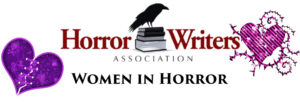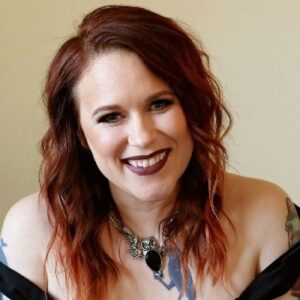Women in Horror: Interview with Meg Hafdahl


Bram Stoker Award nominated Meg Hafdahl is the creator of numerous stories and books. Her fiction has appeared in anthologies such as Eve’s Requiem: Tales of Women, Mystery and Horror and Eclectically Criminal. The Wicked Library and The Lift produced her work into audio, and she is the author of three popular short story collections, including Twisted Reveries: Thirteen Tales of the Macabre. Meg is also the author of the three novels; The Darkest Hunger, Daughters of Darkness, and Her Dark Inheritance called “an intricate tale of betrayal, murder, and small town intrigue” by Horror Addicts and “every bit as page turning as any King novel” by RW Magazine. Meg, also the co-host of the podcast Horror Rewind and co-author of The Science of Monsters, The Science of Women in Horror, The Science of Stephen King, The Science of Serial Killers, The Science of Witchcraft, and the upcoming The Science of Agatha Christie lives in the snowy bluffs of Minnesota.
What inspired you to write?
I was an avid reader since childhood, and naturally drawn into this wonderful notion of creating my own stories! I knew from early on that writing is what I wanted, or maybe needed, to do with my life.
What was it about the horror genre that drew you to it?
Just like writing and reading, my love of horror came to me young, and immediately drew me into these mysterious worlds where women were often the ones vanquishing monsters. In college, I wasn’t sure I wanted to be a genre writer. I felt pressure to be something I wasn’t. But as I grew older, I knew horror was calling my name.
Do you attempt to include female characters and themes in your writing and, if so, what do you want to portray?
Yes. First, it’s natural as a woman that I want to tell stories that resonate with me. And second, horror and gothic fiction really go hand in hand with the female experience. From Mary Shelley on, women have found dark literature to reflect what it’s like living as a woman in a traditionally male-dominated world.
Also, it’s been vital to me I tell stories about complicated females who truly feel authentic. Not “perfect” women, but characters who represent the rest of us, you know, real humans with flaws!
What has writing horror taught you about the world and yourself?
Wow. That we are ALL stronger than we realize. A horror story is about someone going through the worst day of their life, and the truth is, that is happening all around us. Maybe we’re not fighting literal monsters, but this world can be cruel, bad things can happen, yet so many people get through and come out the other side, final girl style!
How have you seen the horror genre change over the years? And how do you think it will continue to evolve?
I think more people realize that horror doesn’t just mean “slasher.” Thanks to many genre-bending creators, audiences are like…wow, maybe I do like horror! Horror fans like myself have known how deep our favorite genre is, but I think this concept is new to many people. They see a Jordan Peele film and they realize horror has a lot to say. Which, it always has! I think horror is going to continue to rise above the average persons’ expectations, and I predict every human will be a horror fan! Okay…maybe that’s wishful thinking!!
How do you feel we have represented women thus far in the genre, and what hopes do you have for representation in the genre going forward?
For book research, I learned from the Geena Davis Institute on Media that horror films are actually quite full of complex, independent women. Women speak more lines in horror films than they do in action, fantasy, or SciFi! That being said, there is always work to allow room for more diversity, and I’d love to see more women of color as the heroine. This goes for books too!
Who are some of your favorite female characters in horror?
So. Many. Merricat in Shirley Jackson’s We Have Always Lived in the Castle, Lydia Deetz, Wendy Torrance, Misery’s Annie Wilkes.
Who are some women who write horror you recommend our audience check out?
Tananarive Due, Hailey Piper, Rachel Harrison, Sarah Gailey, Wendy Webb, R.J. Joseph, Kelly Florence…to name a small few!
What is one piece of advice you’d give horror authors today?
Don’t worry about “what’s been done.” Tropes are well-loved, so take that thing (a haunted house, a zombie, etc.) and make it yours. What unique quality can you bring to it that no one else can? Let’s see this scary subject from your lens!



